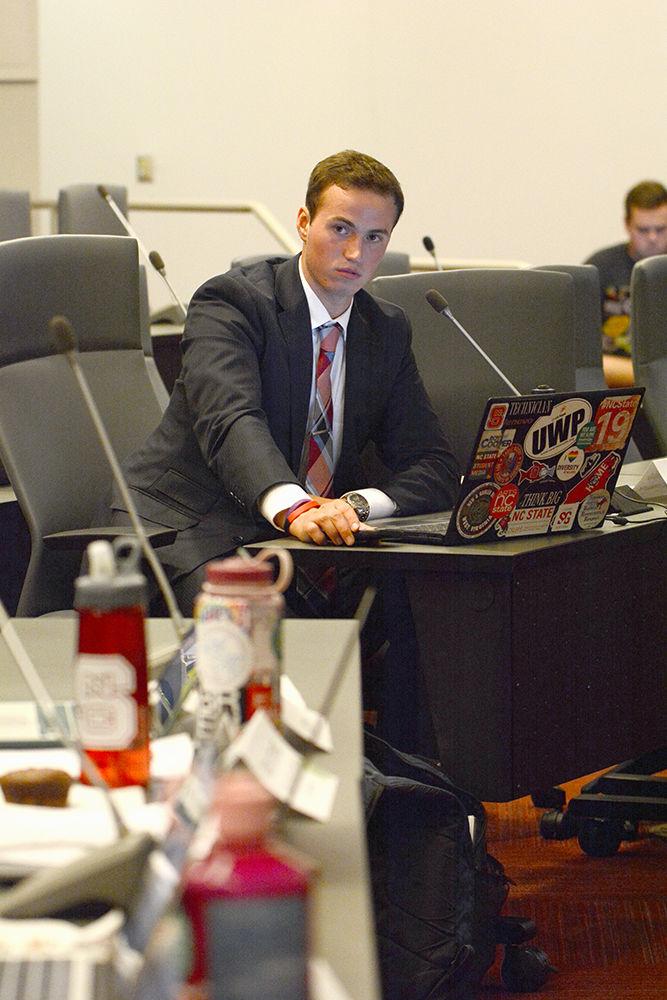The Student Senate Government Relations Oversight (GRO) Committee Chairperson Ryan Dunn and Student Senate President Mitchell Moravec announced Wednesday in a press release that they would repeal all action taken against Student Body Treasurer John Taylor Willis in the first preliminary hearing for charges of impeachment.
The first preliminary hearing, which took place on Sept. 5, resulted in “a continuous breach of parliamentary procedure,” according to the release.
Dunn, a second-year studying political science, explained that the first preliminary hearing was structured so that conduct-related issues would not be discussed.
“The concern was that the committee decided to make the choices that they did during this first hearing because of misunderstood information,” Dunn said. “The Senate president, Mitchell, and I felt that the committee should be made aware of this clarified information and discuss it openly in the committee meeting that happened [Wednesday] night and decide whether or not to reverse the decisions made and restart the process.”
Willis declined to comment on the new preliminary hearing at this time.
There were also complications concerning lack of evidence, which was not allowed in the first preliminary hearing, resulting in uninformed decisions by the committee. Dunn said that the lack of evidence could have contributed to the unclear nature of the first preliminary hearing.
“We know for a fact that we want to include evidence from both sides as well as possibly character and witness testimony because at the first hearing we did not allow physical evidence to be presented, only hearsay,” Dunn said. “We think that may have led to some confusion as well, that can be cleared up if we just upfront allow evidence to be brought forth, either confirming or denying the charges upheld against John Taylor.”
Moravec, a fifth-year studying psychology and materials science and engineering, and Dunn are continuing to work out the details of the new preliminary hearing.
“This is the first time that an impeachment has happened in 10 years, so we’re kind of walking in the dark,” Dunn said. “Statutes give us a basic structure. You have a preliminary hearing then an evidentiary hearing. But there’s no ‘this is what happened at the preliminary hearing, so you go and do this.’”
Student Senate President Pro Tempore Adam Schmidt, a second-year studying civil engineering and senator representing the College of Engineering, is the corresponding sponsor of the Willis Impeachment Bill.
“I think this has all been difficult because it’s more or less unprecedented and our statues don’t give us a whole lot of guidance,” Schmidt said. “I think we all had some frustrations the first time, so I think now that we have a little bit of an idea of what’s going to happen, going back and re-evaluating how we conduct everything during this process will help us do better in general, and make sure all sides are being heard, and all opinions are being considered.”
Schmidt said that the Student Government statutes do not give much guidance on how to handle impeachment. The GRO committee has re-evaluated since the first preliminary hearing and is working to develop a structure where all sides and opinions and heard and considered.
“It’s important to remember that this is not all the Student Government is doing, this is just one tiny thing,” Dunn said. “I see that SG is doing a lot of other things, sponsors of the bill are working on other projects, we’re not one-trick ponies.”
Dunn said that he and Moravec are trying to figure out what will work best during the new hearing for both parties.
“It’s basically just making sure that all our t’s are crossed and all our i’s are dotted,” Dunn said. “[It’s] to make sure that this doesn’t happen again but make sure that we have a structure so that in the future should another impeachment come up 10 years from now, the Senate president and the future GRO chair will have the structure to look back on.”
A date for the hearing has not been scheduled, but it must be announced at least 48 hours in advance, per Student Government statutes.








